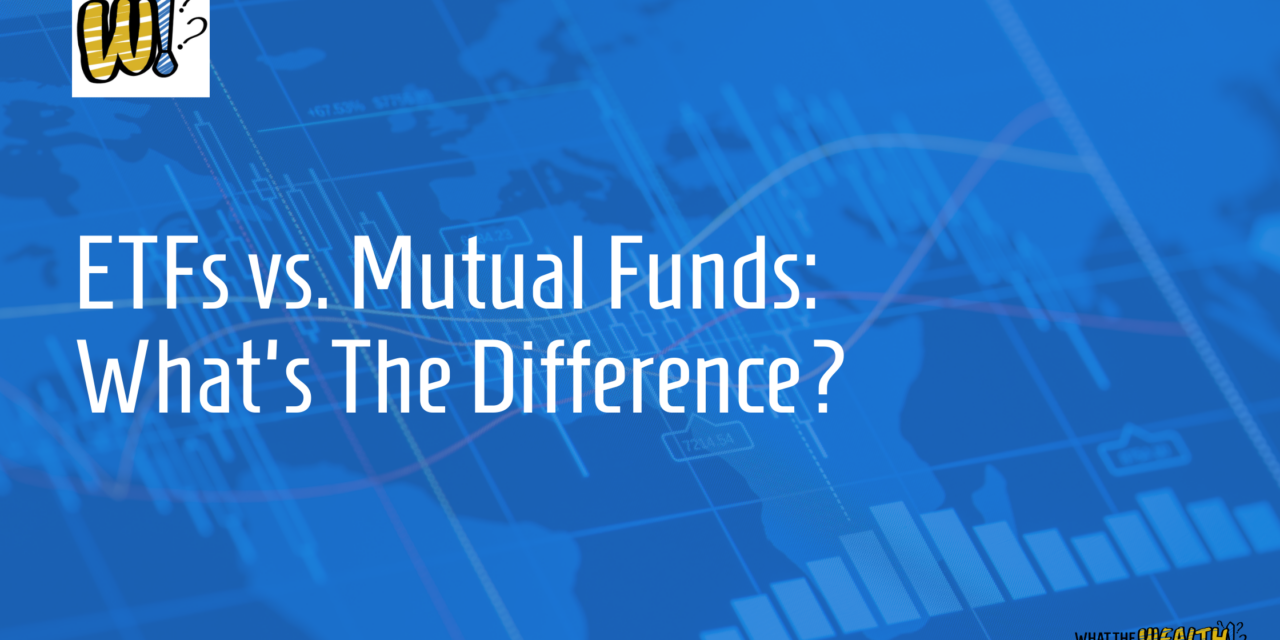I love receiving questions from listeners. Over the 51 episodes of What The Wealth, I’ve learned that if one listener writes in with a question, hundreds more have the same question! So today, we’re going to discuss a listener’s question; ETFs vs. mutual funds; what’s the difference?
While ETFs and mutual funds have several similarities, they also have some key differences, and we’ll walk through them.
Similarities Between ETFs and Mutual Funds
The very first mutual fund was created way back in 1774! But the first modern mutual fund is a bit younger, founded in 1924. The first ETF is just a baby in comparison, founded in 1993. Though ETFs may be younger, they have gained popularity quickly, particularly in the last 10 to 15 years.
Both ETFs and mutual funds are managed and run by professional money managers. And both own or are comprised of a basket of securities that can include stocks, bonds, and commodities to provide investors with a lot of diversity without having to research and buy individual securities. When you invest in an ETF or mutual fund, you will own hundreds or even thousands of different securities within that ETF or mutual fund.
While offering diversity, some ETFs and mutual funds are focused on a specific sector; growth, value, tech, healthcare, etc.
Key Differences Between ETFs and Mutual Funds
ETFs are traded on the stock market, just like a stock. The opening bell rings at 9:30 Eastern and the closing bell at 4:00. ETFs trade during those hours, and their price fluctuates during the trading day, just like stock prices. If you buy or sell an ETF at 10:42, the price will be whatever it was at that moment.
Mutual funds trade at the net asset value (and sometimes included fees) and can’t be bought or sold until the closing price is settled at the end of the trading day. So if you buy or sell a mutual fund at 10:42, the order won’t go through until the price has settled for the day. The asset value has to be recalculated based on the price of the current holdings inside the mutual fund.
Not always, but generally, ETFs, especially index funds, are less expensive than mutual funds. If an ETF is focused on a very niche area like biotech, for example, the costs may be a little more in line with those of traditional mutual funds.
ETFs trade much cheaper on the internal expense ratio (IER) compared to mutual funds. The IER is the fee portfolio managers and the company charge to create the funds, manage the investments inside them, and to have them listed.
Tax Efficiency of ETFs and Mutual Funds
Tax efficiency is another key difference between ETFs and mutual funds. When an investor redeems a mutual fund, the fund has to sell securities to pay out. At the end of the calendar year, the fund has to issue long and short-term capital gains as they shore up the fund and transactions from things like rebalancing, trading, swapping securities in and out, and paying out when investors redeem. This causes long and short-term capital gains, which get passed on to the investor.
If the mutual fund was a retirement or other tax-advantaged account, those long and short-term capital gains sent to you may not make it a taxable event. But in a taxable account, those capital gains distributions are a taxable event for you.
ETFs are different. They are created and redeemed in a way that is non-taxable. They do not generally pay out capital gains to those who have invested in the ETF, making them much more tax efficient than mutual funds.
Which is Best?
When it comes to ETFs vs. mutual funds, it’s not a matter of one being better than the other. Generally, we favor ETFs because of their lower expenses and tax efficiency. But the most important factor is the underlying securities in one of the other and how they fit into your overall investment strategy.
If you have questions about ETFs, mutual funds, or anything else regarding financial planning, I’d love to hear from you so we can work together to Create The Life You Love!
ETFs trade like stocks, are subject to investment risk, fluctuate in market value, and may trade at prices above or below the ETF’s net asset value (NAV). Upon redemption, the value of fund shares may be worth more or less than their original cost. ETFs carry additional risks such as not being diversified, possible trading halts, and index tracking errors.
Exchange Traded Funds concentrating in specific industries are subject to higher risks and volatility than those that invest more broadly.
Investing in mutual funds involves risk, including loss of principal. Fund value will fluctuate with market conditions and it may not achieve its investment objective.
Listen to the Full Episode:
What You’ll Learn In Today’s Episode:
- What an exchange-traded fund is.
- How ETFs differ from other funds when it comes to price.
- How different funds are taxed.
- How ETFs compare against stocks.
Ideas Worth Sharing:
“They are baskets of securities that allow you to be diversified.” – Jonathan Bednar
“Generally speaking, exchange-traded funds are cheaper than mutual funds.” – Jonathan Bednar
“In general, ETFs are not paying out capital gains.” – Jonathan Bednar
Resources In Today’s Episode:
- Jonathan Bednar: Email | Twitter | LinkedIn
- What The Wealth?! by Jonathan Bednar
Enjoy the show? Use the Links Below to Subscribe:





